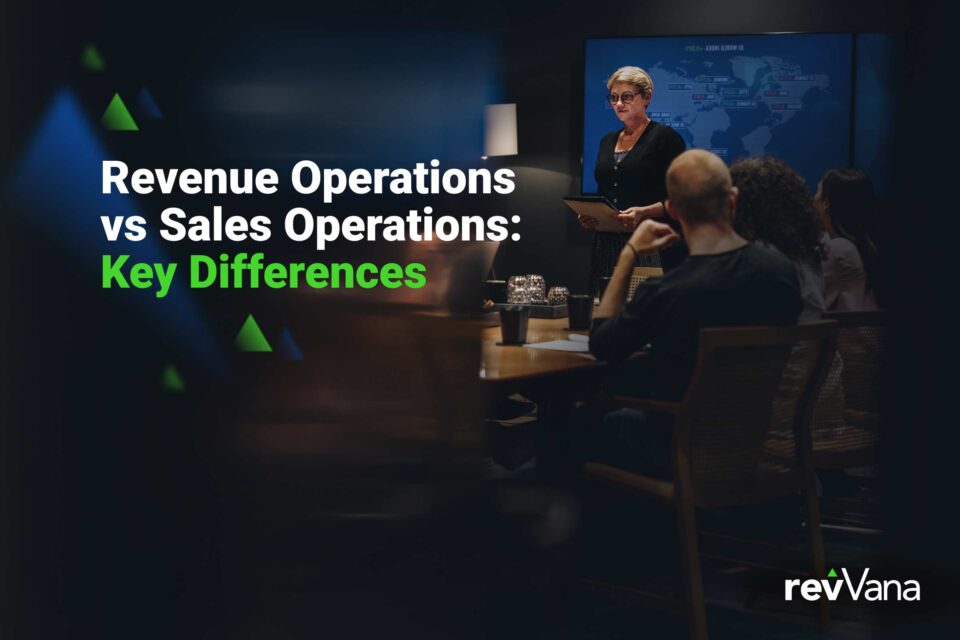

What Is Revenue Operations (RevOps) and Why Is It Important?
Learn about Revenue Operations (RevOps) as a strategy to align siloed revenue teams within B2B and B2C companies and unify revenue goals and targets.

Published on Wednesday, August 30, 2023
Technology evolution has changed consumer buying behaviors, prompting companies to rethink customer and revenue lifecycles. This led to the rise of revenue operations (RevOps) and sales operations (SalesOps) roles. While both aim to eliminate departmental silos and increase revenue, they differ in important ways.
To better understand the key differences between revenue operations vs. sales operations, and the role each plays in your business, let’s take a look at their key functionalities and how they compare.
Related article: What is Revenue Operations (RevOps) and Why is It Important?
What is Sales Operations (SalesOps)?
Sales operations, a vital part of RevOps, aims to equip sales departments with essential resources for top productivity and to refine data collection for precise revenue forecasts. SalesOps leaders enhance sales practices and offer cross-department visibility. Previously overlooked, sales operations gained prominence as companies realized their high-value data’s impact on business growth and revenue management.
SalesOps now employs software tools, engagement techniques, and strategic planning to boost growth. Data helps with accurate revenue and pipeline forecasting, financial planning, and driving better sales strategies to achieve company objectives.
SalesOps teams support sustainable growth through various functions, which may vary depending on company size. Key functions include:
SalesOps helps set achievable sales goals and enables strategic adjustments in sales approaches. The specific needs and goals of a company determine its SalesOps functions. SalesOps and RevOps, while distinct, complement each other to drive growth.
By optimizing sales processes, SalesOps plays a critical role in a company’s overall success. It analyzes and identifies areas for improvement, ensuring the sales team is equipped with the right tools, technology, and training. Through data-driven insights, SalesOps assists in making informed decisions, increasing efficiency, and reducing sales cycle times. Moreover, it collaborates closely with marketing and customer success teams to ensure alignment of objectives and strategies.
SalesOps fosters a cohesive approach to business growth, enhancing customer satisfaction and driving long-term revenue generation. While operating as separate entities, the synergistic relationship between SalesOps and RevOps empowers businesses to reach their full potential.
Related article: The Optimal Sales Operations Organizational Structure and Why RevOps Must Play a Role
The notable difference between revenue operations and sales operations is that while RevOps focuses on the functions of multiple company departments to encourage business growth, SalesOps solely focuses on the sales functions of a company. In other words, SalesOps can be viewed as a subset of RevOps.
RevOps will implement various functions that support cross-department visibility of not only sales operations, but company departments including marketing and customer success as well. When a company implements a RevOps team, SalesOps can better target its sales efforts while RevOps collects and analyzes data that can be used for forecasting and planning purposes.
Check out this grid which breaks down the major differences between Revenue Operations and Sales Operations:

Deciding when to hire a SalesOps team depends on your company’s needs and size. Startups without marketing or customer success teams should prioritize SalesOps, allowing better-targeted tactics to drive revenue planning and enable team expansion.
When the sales team is overwhelmed with organizing data and planning, it’s time to build a SalesOps team to improve data recording and planning efforts, free up sales reps to increase conversions, and designate a leader responsible for coordinating sales processes.
While ongoing company growth and expansion is a wonderful thing, a lack of company structure and functions will ultimately be harmful in the long run. If your company has expanded enough to possess various operational teams, including sales, marketing, and customer success, but is still encountering hurdles with increasing sales revenue, it may be time to bring on a RevOps team.
A lack of cross-department visibility will be one of the largest negative impacts on your company’s growth. If your company departments are not effectively communicating or sharing crucial data, these inefficiencies could cause you to lose revenue. Plus, data that significantly varies across different departments can induce costly inaccuracies in revenue forecasting and planning processes.
Related article: How to Build a Revenue Operations Strategy That Will Grow Your Company
If your company is growing rapidly, you may realize you need more than SalesOps. RevOps provides companies with the opportunity to maximize the impact all of their teams have on revenue, and not just the sales team. If you’re ready to go that route, it’s time to get started with the transition.
Building a RevOps strategy from the ground up takes time and commitment, but it will pay dividends for your company almost immediately. We’ve put together a free whitepaper to help you get started. It’s available for download below.
Further reading:
How to Structure Your Revenue Operations Team for Success
How to Calculate and Improve Revenue Growth
Eight Tactics to Implement a Growth Strategy